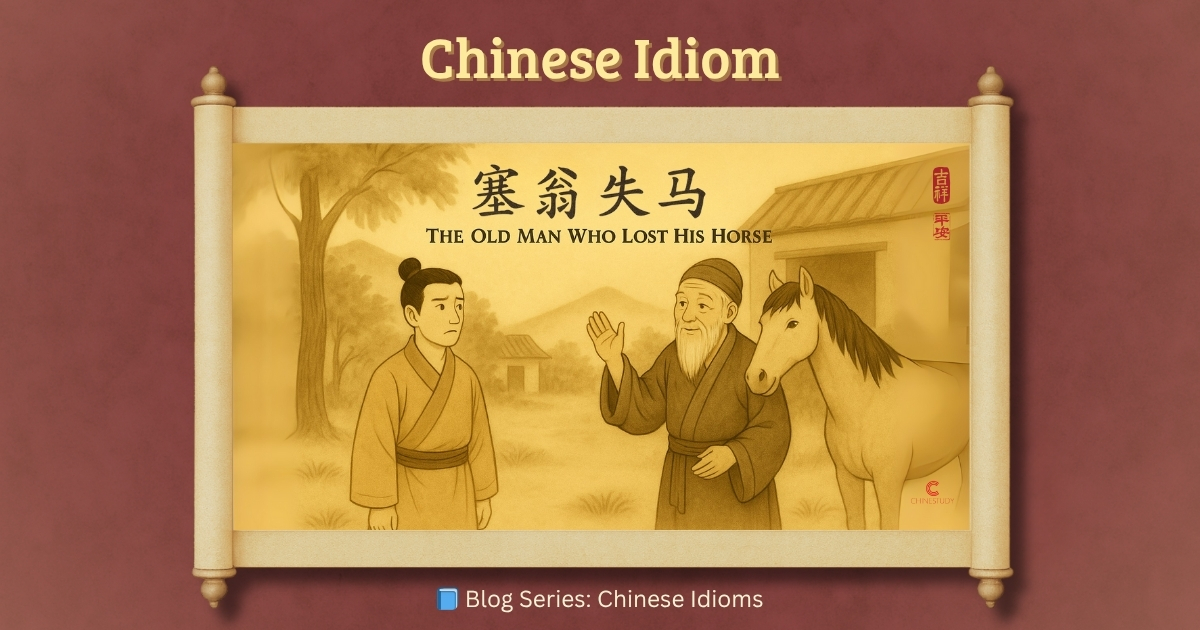🐎 塞翁失马 sài wēng shī mǎ – A Blessing in Disguise

🔍 What It Means
塞翁失马 (sài wēng shī mǎ) literally means:
“The old man from the frontier lost his horse”
Word-by-word breakdown:
- 塞 (sài) – border, frontier
- 翁 (wēng) – old man
- 失 (shī) – to lose
- 马 (mǎ) – horse
This idiom describes a situation that seems bad at first — but might lead to something good.
It reminds us: you never know if something is truly good or bad until later.
In English, it’s like saying:
- 🎭 Every cloud has a silver lining
- 🔄 A blessing in disguise
- 🤷 Things aren’t always what they seem
🏺 Where It Comes From
This idiom comes from an old Chinese story in the book《淮南子》(Huáinánzǐ).
A wise old man lived near the frontier.
One day, his horse ran away into the wild.
His neighbors came to comfort him.
But the old man calmly said:
— “Who knows if this may turn out to be a good thing?”
Everyone found that strange — how could losing a horse be good?
A few months later, the lost horse returned —
and brought back a strong, beautiful stallion!
The neighbors celebrated the good fortune.
But the old man said again:
— “Who knows if this will become something bad?”
Soon, his son began riding the new horse.
One day, he fell off and broke his leg.
The neighbors all felt sorry for the son.
But the old man just said:
— “A broken leg might not be such a bad thing either.”
Later that year, war broke out.
All the young men in the village were forced to join the army.
Most of them died in battle.
But the old man’s son — because of his injury — stayed home and survived.
That’s how the saying “塞翁失马 (sài wēng shī mǎ)” was born.
It means:
When something bad happens, it might turn out to be good.
When something good happens, it might turn out to be bad.
You never know — so stay calm, and keep going.
💬 How to Use It
Use 塞翁失马 (sài wēng shī mǎ) when something bad happens, but it might turn out to be good later.
❌ It’s not about celebrating failure right away
✅ Often used to stay calm during bad times or surprises
✅ Common in life advice or comforting someone after a setback
✅ Reminds people to wait and see what happens next
🎯 Real Examples
1.
我错过了那份工作,但后来找到了更好的。真是塞翁失马,焉知非福!
(Wǒ cuòguò le nà fèn gōngzuò, dàn hòulái zhǎodào le gèng hǎo de. zhēn shì sài wēng shī mǎ, yān zhī fēi fú!)
👉🏻 I missed that job, but later found a better one. Truly a blessing in disguise!
2.
她没通过考试,可因此重新思考了自己的方向。塞翁失马,也许是好事。
(Tā méi tōngguò kǎoshì, kě yīncǐ chóngxīn sīkǎo le zìjǐ de fāngxiàng. sài wēng shī mǎ, yěxǔ shì hǎoshì.)
👉🏻 She failed the exam, but it made her rethink her path. Maybe it’s a good thing after all.
⚠️ Common Mistakes (Watch Out!)
❌ Mistake: Using it to describe pure good luck
✅ Correct: It means a situation seems bad, but might lead to something good
❌ Mistake: Thinking the idiom guarantees a good outcome
✅ Correct: It’s about staying open-minded and accepting change, not predicting the future
💡 Memory Tip
Imagine:
You miss your train and feel frustrated.
But then you hear—
that the train you were supposed to be on had a serious delay.
And because you waited, you discover a quiet café nearby and make a new friend.
Missing the train felt bad at first — but it led to something good.
That’s a 塞翁失马 (sài wēng shī mǎ) moment:
What seems unlucky now… might be a hidden blessing.
🧩 Interactive Practice
Translate this sentence into English:
- 人生有很多塞翁失马的时刻,我们需要耐心等待。
Answer:
Life has many blessing-in-disguise moments — we just need to wait patiently.
🌟 Final Thoughts
塞翁失马 (sài wēng shī mǎ) reminds us that life is full of surprises.
Something that feels like a loss today might open doors tomorrow.
So next time you face bad news, ask yourself:
Is this really bad… or is it just the beginning of something else? 🤔
🏮 One story ends, but many more await…
👉 Stay tuned for the next idiom in this series!
Thank you for subscribing!
Have a great day!